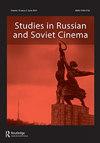Editorial
IF 0.4
0 FILM, RADIO, TELEVISION
引用次数: 0
Abstract
At Studies in Russian and Soviet Cinema, we condemn the Russian invasion of Ukraine and the suffering it brings to the people of Ukraine. As an academic journal, we consider scholarship an important domain for critical reflection and intellectual exchange. We wish to distinguish between the regime and individual scholars, who often vociferously and at significant risk continue to articulate their dissent from the system. As a scholarly journal devoted to cinema of the former post-Soviet space, we publish scholarship independent of authors’ citizenship and cover the cinematic histories and cultures of the entire postSoviet space: a clear and lucid analysis is the best way to understand cultural strategies, including the use of cinema as a form of soft power. In the second issue for 2022, Studies in Russian & Soviet Cinema presents four articles, which cover a range of aspects of Soviet cinema and its history. In chronological order, we start with an article by Patrícia Silveirinha Castello Branco, who considers the haptic visuality in Eisenstein’s film theory between revolutionary and bourgeois thought, between tradition and the avant-garde, between mechanical and artisanal. Her contribution is followed by two articles about Thaw-era cinema: Olia Kim studies the concept of ‘poetic cinema’ in Soviet and post-Soviet critical discourse; and Maria Mayofis traces the genealogy of the intelligentsia through two Thaw-era films. Finally, Aleksandra Shubina’s quirky analysis of the science-fiction character Alisa Seleznёva concludes the article section. We have a small number of book reviews (which now feature in each issue rather than being clustered in the final issue each year), prepared by Stephen M. Norris, to whom I express my gratitude. As always, Studies in Russian & Soviet Cinema encourages submissions on any aspect of Soviet, post-Soviet and Russian cinema and visual culture, including the post-Soviet space. We operate a system of double-blind peer-review; submissions should be original (i.e., previously unpublished, including publications in another language) and will be considered at any time throughout the year. They should be sent to the editor at birgit.beumers@gmail.com.社论
在俄罗斯和苏联电影研究中,我们谴责俄罗斯入侵乌克兰及其给乌克兰人民带来的痛苦。作为一份学术期刊,我们认为学术是批判性反思和知识交流的重要领域。我们希望区分政权和个别学者,这些学者经常大声疾呼,冒着巨大的风险继续表达他们对体制的异议。作为一份致力于前苏联后空间电影的学术期刊,我们出版独立于作者国籍的学术成果,涵盖整个后苏联空间的电影历史和文化:清晰明了的分析是理解文化策略的最佳方式,包括将电影作为一种软实力形式的使用。在2022年的第二期,《俄罗斯和苏联电影研究》将发表四篇文章,涵盖苏联电影及其历史的各个方面。按照时间顺序,我们从Patrícia Silveirinha Castello Branco的一篇文章开始,他认为爱森斯坦电影理论中的触觉视觉性介于革命与资产阶级思想之间,传统与前卫之间,机械与手工之间。在她的贡献之后,她又发表了两篇关于陶时代电影的文章:奥利亚·金研究了苏联和后苏联批评话语中的“诗意电影”概念;玛丽亚·梅奥菲斯(Maria Mayofis)通过两部解冻时期的电影追溯了知识分子的谱系。最后,Aleksandra Shubina对科幻小说人物Alisa Seleznёva的古怪分析结束了文章部分。我们有少量书评(现在每期都有,而不是每年最后一期),作者是斯蒂芬·m·诺里斯(Stephen M. Norris),我对他表示感谢。一如既往,《俄罗斯和苏联电影研究》鼓励提交关于苏联、后苏联和俄罗斯电影和视觉文化的任何方面的作品,包括后苏联空间。我们实行双盲同行评审制度;提交的作品必须是原创的(即以前未发表的,包括其他语言的出版物),并将在全年的任何时间进行审议。请将稿件发送至birgit.beumers@gmail.com。
本文章由计算机程序翻译,如有差异,请以英文原文为准。
求助全文
约1分钟内获得全文
求助全文

 求助内容:
求助内容: 应助结果提醒方式:
应助结果提醒方式:


